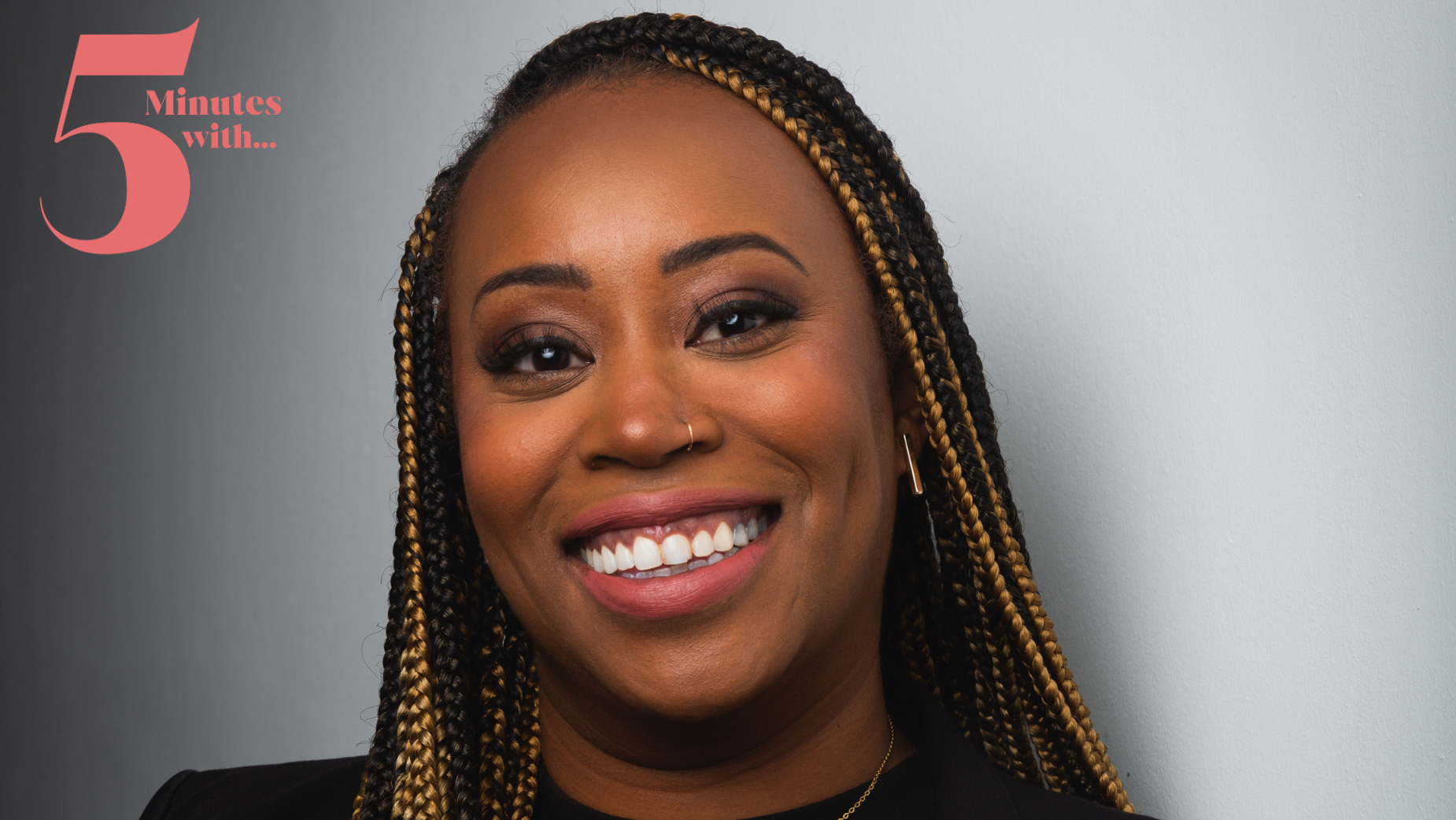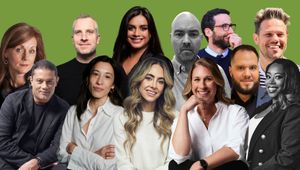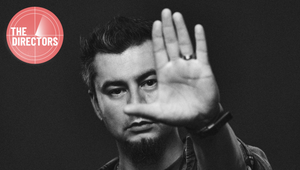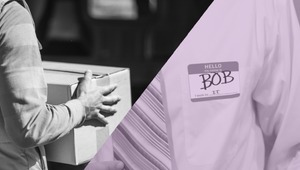
5 Minutes with... Amina Folarin

While many agency CEOs came up through the suit route, OLIVER’s UK group CEO Amina Folarin had a different career path. She built her professional reputation in HR roles, which means she’s a people-focused leader. Which is great for OLIVER, because what is a creative agency if not a group of carefully-curated, talented people who have been nurtured to bring out the best of their team?
Amina stepped up from her role as chief inclusion and people officer at the start of 2023, so now she’s used to the CEO life, LBB’s Alex Reeves chatted to her about her career and what her biggest priorities are at work.
LBB> What were you like as a kid? And does that have any bearing at all on what you've ended up doing?
Amina> Looking back at my early years, I was always a bit rebellious! I remember at school always being in trouble. And my school reports always said, 'Amina is so confident. She'd be brilliant if she stopped talking in class and distracting everyone.'
I've always wanted to bring people together. When I was at secondary school, I organised our first end-of-year prom, single-handedly convincing the headmaster to let me do it. They didn't give me any budget, so I charged people to come in, but we had our prom.
That drive to push the boundaries and do something different, uniting people in the process, has definitely played a role in what I’ve ended up doing.
LBB> How did you end up in your career? Did you have any sort of plan or was it a series of happy accidents?
Amina> At university, I worked in retail to support myself, and I really enjoyed it. I was a store manager at All Saints on a Sunday before I even finished. I don't know why they trusted me with the keys to their whole shop, but they did. I think I've always been someone that's been trusted with more responsibility than what you'd expect.
I knew that I didn't want to get stuck on the shop floor though; I read French at university so thought I would go and work for the European Union as a translator but didn’t realise you needed to have two languages plus English to do so! I didn’t want to go back to study another language, so I knew I needed to do something else.
There was a role in the customer service department at All Saints and I thought, ‘Let me at least just get a head office job.’ It didn't pay very well, and I had to have a second job just to survive. Even then, with the cost of living being less, it was still hard. By the time I'd paid my rent, I wasn't doing much else, other than travelling to work.
It was during a time when All Saints was expanding massively across Europe. My old area manager, who I'd see from time to time in head office, said 'I'm off to Paris next week to interview some candidates.' So, I put my degree to good use and went to Paris with him to translate. After that, they offered me a job in retail operations, helping them open stores across Paris. I was getting the Eurostar from London to Paris once a week. Once that team was up and running, I helped train them on how to use all the systems.
LBB> How did you step into HR from that?
Amina> I was in this role when I got stuck in the basement in this dingy office emailing stores, and realised I couldn't work on my own in that way. So, I reflected on what it was about this job that I liked and thought, ‘Is there a career in that?’ I really enjoyed the recruitment side and enjoyed being around the team, training them and developing them. I did a bit of research and came up with HR, and realised that's the career I wanted to explore.
I found it quite hard to get into, but luckily, there was a woman I'll never forget: Trisha. She was a Black HR Director leading a small HR team – it was inspiring to see her breaking down boundaries. It felt like a career I could do well in. They were going on holiday because one of her team was getting married. So, I was in charge of the HR department while they were away for two weeks. It went really well, and she told me there was something about me, and that she wanted to give me a chance. She offered me a permanent junior role in the office, but I didn't want to deliver people's post. By which point, I'd applied for a job at a luxury fashion company in the HR team. And got it, and that's how I got into HR.
LBB> What were the big moments that helped you realise something about what's important to do a good job in HR?
Amina> At one point, I felt trapped in a pretty toxic environment. I wanted to work somewhere I could thrive and grow my career, and feel like I was making a difference. I spoke to a great recruiter, and she said that the best leaders that she'd worked with were people that were a bit more deliberate about broadening their careers with sidewards steps. These days, a lot of people just chase the upward move, but they don't take time to really get that depth of experience across different things.
There was a talent role that came up at Metro. It was a completely different culture and a completely different take on HR to what I’d been used to. The CEO was quite pioneering for the time. He was a working-class lad from Lancashire who believed that if he invested in his people and developed them, they'd be happy to work there and bring in more money. That whole employee engagement piece that I feel like a lot of businesses didn't start cottoning onto until 2015-ish? He was already doing that work in 2010.
About 60% of my job was culture-based, which included things like 'what would make you happy at work?' 'Cheese Tuesdays?’. I remember trekking to Tesco to buy bags of cheese, and we'd all come together and have cheese and a chat. There were lots of other things that he did, but they were all really great rewards.
That role made me realise that's what I like about HR – helping people to be their best selves and helping them thrive. I did a lot of recruitment in that job. They were quite open. They had to be because there weren't tons of people that could do ad sales. So, we were able to look at the transferable skill sets and hire people on their skills rather than their past experience. We would train them up to do the other stuff. I'd say that that's an ethos that I've tried to always take with me. To question whether they have the right attitude and the right skills, rather than the right experience? Because you can give them experience once they’re in the door.
LBB> Later on, your roles took on a more explicitly DE&I capacity. As someone working in HR, when did that really start to become a serious part of your job?
Amina> I'd always done it. It was just that pre-2020, it was the awkward elephant in the room. A tick box exercise in a lot of cases. Then in 2020, it became an official part of my job. I was like ‘I've been doing this work for years!’
That's just who I am. And people find that quite confronting, but quite honestly, am I confronting or am I confronting them with something that they could and should change? I believe that inclusion is not just about ethnicity, it’s so much richer than that.
I think pre-2020 in the UK, when you said 'diversity and inclusion' it was all about women and gender equality. And that's not where it started. It was specifically started in North America to increase Black representation in the corporate world. And when it came over here, it became a diversity agenda for women more than anything else.
What 2020 did, with George Floyd's murder during the pandemic, is wake a lot more businesses up to the realities of the Black and brown experience. I would caveat that though: looking on LinkedIn, how many DEI vacancies are actually there right now? How many people got jobs, got promoted, left roles, were the only Black person in their organisation and suddenly got tasked with being in charge of DEI? I'm not knocking them for it as it created a wave of opportunities for people. However, enough of the real work is not being done.
We have a long way to go as an industry. Research shows DEI has officially been downgraded on the agenda, with just 41% of marketers predicting diversity and inclusion will be a marketing priority in the next five years, a decline from 2021’s 59%, according to The CMO Survey.
Marketers and business leaders can’t just pick and choose to be authentically inclusive when it’s trendy or suits their budgets. It has to be an ongoing commitment to do and be better for everyone we serve – customers, clients and employees alike.
LBB> It wasn’t until 2015 that you got into your first advertising agency. What were your thoughts on this industry that you'd suddenly ended up in then?
Amina> I don't think I really understood the industry properly until I came to OLIVER. I was in HR in quite a tech-focused business, so I didn’t have much exposure to it. When I first started in advertising, I felt there was a lack of investment in people, the culture was just people wanting to do good work. And I think there was a lot of arrogance around that. A lot of agencies keep hold of their talent, not because they invest in them or their careers, but because creative people want to get their creative outlet. They want to be the person that makes the next Cadbury ad.
For me, at that time, I actually wanted to leave the industry. And then I came to OLIVER. I saw how they really want to put their people first. And I saw the power we have in this industry to create and nurture incredible talent that both love the work they do, and the place they work.
LBB> What attracted you to OLIVER and what's kept you there for the past eight years?
Amina> I needed a job. Let's keep it real. I wanted to get out of where I was working and was ready for a new challenge. Then I got a call from a recruiter who'd been tasked with finding a Head of HR for OLIVER. What was great about her approach was that she hadn't worked in the industry hiring HR staff, so she looked outside of the normal network.
I met Sharon Whale, our global deputy chief executive, and Paul Bonnette, who's now our CEO in APAC. I thought, ‘maybe these people are a bit different.’
With the big holding companies, you just don't get the same autonomy, so I liked that OLIVER was independently owned and had an ethos of disrupting the status quo at its core. They were focused on their culture, and I had the opportunity to build something really special. Plus, I could instantly tell I would learn a lot from Sharon. So, I went through the interview process, and then the rest is history.
Over the last eight years, I’ve had so many opportunities to learn and grow at OLIVER. Being around amazing leaders like Sharon, our founder and CEO Simon Martin, and the incredible pool of talent we have here, has really helped to shape the businesswoman and leader I am today. Simon trusting me to take the UK business through its next stage of growth was an incredible honour and a challenge I couldn’t walk away from. And what an experience it’s been so far!
I’ve had a pretty unconventional journey to CEO, coming through HR. But that time focusing on our people has really helped me understand our model and how OLIVER fully embeds our experts into our clients’ worlds to drive efficiency and effectiveness. Knowing what that experience looks like for our teams, operating across a variety of sectors and industries, the challenges they face and successes they’ve experienced, meant I came into the role with fresh eyes on how we can be our clients’ closest partner. I can’t imagine being anywhere else.
LBB> What were your first big focuses at OLIVER?
Amina> The first thing I had to do when I joined was get everyone on the HR system properly.
We had to transform our start-up mentality to a large-scale business operation. So, my first year was spent building the HR department and the talent team, putting in some of the basics like appraisals, proper processes and procedures.
I was able to do some management development training, which I really enjoyed. I then trained about 200 managers myself, before we built out our team with the right talent to take over. I proved that it was something that people really valued. And then of course, we were global, so I tackled how we could scale all of our work in the UK, to our other regions.
LBB> You became UK group CEO at the start of 2023. What were the biggest adjustments in terms of expanding on your role from being focused on the people and talent side to a lot more than just that?
Amina> OLIVER is an exceptionally fast-growing, dynamic and entrepreneurial environment. We’re constantly adapting alongside our clients.
Now I'm client facing, I spend a lot of time with them in the marketing ecosystems we’ve created with them, which I enjoy – helping them navigate challenges and working to solve their problems.
Unpicking the opportunities gen AI offers us, and our clients, has also been a really interesting challenge. It’s shifting how everyone is or will run their marketing in the future. Navigating so much change – both internally, with the tech we offer as part of The Brandtech Group and training our people up on it, and externally in the industry as a whole – has been quite a big adjustment. But a fun one, it’s all very exciting.
As a compromise, I don't get to spend as much time doing other things that I love, like developing people and talking about talent. Being in this role, I do think about my people, but there's so many pulls on your time that sometimes it can feel like you can’t give that quality time or attention. Even though everything you do is because you want people to have fulfilling careers that challenge them and provide opportunities for them to grow. Although we have brilliant HR and L&D teams, who I know have that all in hand.
I read this quote, and I'm trying to anchor myself around it all the time now: The measure of a good leader is not what they do, but how many leaders they develop. That is my purpose. My job is not to make myself so involved in things that the organisation cannot function without me. My job is to develop and enable really good leaders to come up and drive positive change across the business, for both clients and OLIVER. And people from all walks of life within that.
Obviously managing the finances rather than spending them, has also been an adjustment!
LBB> Beyond creating leaders, what are you recently most proud of?
Amina> Obviously, awards. OLIVER won Campaign UK In-house Agency of the Year for the fourth year in a row – that’s no mean feat! It's great that we're still being recognised for the great work that we do across our portfolio of clients.
There’s also all the positive change happing inside our business, I can’t forget to mention that. Our Change Team – bringing DEI and Environmental Sustainability ambitions together – is very busy. We've got to a point where they are a lot more facilitators of change in the business, which is brilliant. This year, due to the efforts of our production teams in implementing AdGreen training and processes, we were named AdGreen’s number one Superuser for 2023.
Our ERGs are doing the work on the ground. They’re really driving a sense of community and making OLIVER a better place for its people – from LQBTQ+ panels, to a menopause policy, they’re educating, inspiring and driving change for the better. Our Mental Wellbeing ERG was recently selected as a finalist in the Outstanding Wellbeing Network of the Year for the Diversity Network Awards.
I think a sense of community, particularly in a time where there's a loneliness epidemic, is key to keeping employees engaged and excited to come to work. So, our ERGs are really important to me and the business, and so they should be recognised for the work that they do. I’m incredibly proud of them.















